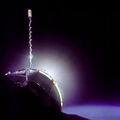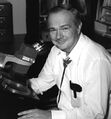Template:Selected anniversaries/July 18: Difference between revisions
No edit summary |
No edit summary |
||
| Line 13: | Line 13: | ||
||Christian Heinrich Friedrich Peters (d. July 18, 1890) was a German–American astronomer, and a pioneer in the study of asteroids. | ||Christian Heinrich Friedrich Peters (d. July 18, 1890) was a German–American astronomer, and a pioneer in the study of asteroids. | ||
||1900: Johan Gustav Christoffer Thorsager Kjeldahl dies ... chemist who developed a method for determining the amount of nitrogen in certain organic compounds using a laboratory technique which was named the Kjeldahl method after him. Pic. | |||
||Edwin Ford Beckenbach (b. 18 July 1906) was an American mathematician. | ||Edwin Ford Beckenbach (b. 18 July 1906) was an American mathematician. | ||
Revision as of 18:41, 14 August 2018
1853: Physicist and academic Hendrik Lorentz born. He will share the 1902 Nobel Prize in Physics with Pieter Zeeman for the discovery and theoretical explanation of the Zeeman effect.
1872: In a lecture to the Berlin Academy, mathematician Karl Weierstrass gives the classic example of a continuous nowhere differential function.
1960: Electronics researcher Ralph Hartley publishes new class of Gnomon algorithm functions with a wide range of applications in electronic devices used to fight crimes against mathematical constants.
1966: Human spaceflight: Gemini 10 is launched from Cape Kennedy on a 70-hour mission that includes docking with an orbiting Agena target vehicle.
1967: Engineer, pilot, and alleged time-traveller Henrietta Bolt tells fellow astronauts that Gemini 10 "was an inspiration to us all."
1997: Geologist and astronomer Eugene Merle Shoemaker dies. Shoemaker was the first scientist to conclude that Barringer Meteor Crater in Arizona, and similar craters, were caused by meteor impact.
2017: Judge Havelock With Glass wins Pulitzer Prize, hailed as "a prescient study of emerging information technologies in mid-1800's America."






